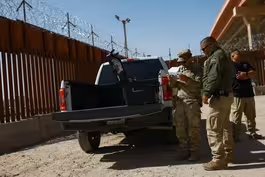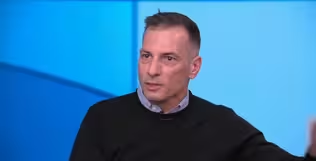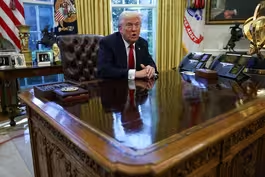
How automakers are navigating Trump’s tariffs
Clip: 3/27/2025 | 6m 50sVideo has Closed Captions
How automakers are navigating Trump’s tariffs on imported vehicles and parts
Foreign leaders in Europe, Canada and Asia sharply criticized President Trump’s announcement of 25 percent tariffs on imported cars and car parts. Nearly half of all passenger vehicles sold in the U.S. last year were assembled outside the country and experts say the tariffs could upend the global automotive industry. Amna Nawaz discussed more with Gavin Bade of The Wall Street Journal.
Problems playing video? | Closed Captioning Feedback
Problems playing video? | Closed Captioning Feedback
Major corporate funding for the PBS News Hour is provided by BDO, BNSF, Consumer Cellular, American Cruise Lines, and Raymond James. Funding for the PBS NewsHour Weekend is provided by...

How automakers are navigating Trump’s tariffs
Clip: 3/27/2025 | 6m 50sVideo has Closed Captions
Foreign leaders in Europe, Canada and Asia sharply criticized President Trump’s announcement of 25 percent tariffs on imported cars and car parts. Nearly half of all passenger vehicles sold in the U.S. last year were assembled outside the country and experts say the tariffs could upend the global automotive industry. Amna Nawaz discussed more with Gavin Bade of The Wall Street Journal.
Problems playing video? | Closed Captioning Feedback
How to Watch PBS News Hour
PBS News Hour is available to stream on pbs.org and the free PBS App, available on iPhone, Apple TV, Android TV, Android smartphones, Amazon Fire TV, Amazon Fire Tablet, Roku, Samsung Smart TV, and Vizio.
Providing Support for PBS.org
Learn Moreabout PBS online sponsorshipGEOFF BENNETT: Welcome to the "News Hour."
Foreign leaders in Europe, Canada and Asia tonight sharply criticized President Trump's announcement of 25 percent tariffs on imported cars and car parts, with some suggesting they may strike back with new tariffs of their own.
AMNA NAWAZ: Nearly half of all passenger vehicles sold in the U.S. last year were assembled outside the country.
Experts said the tariffs could upend the global automotive industry and raise prices for consumers.
The administration said the move, scheduled to take effect next week, would spur domestic manufacturing and lead to over $100 billion in new annual revenue.
French President Emmanuel Macron called it both a betrayal and bad economic policy.
EMMANUEL MACRON, French President (through translator): Imposing tariffs means breaking value chains.
It means creating in the short term an inflationary effect and destroying jobs.
So it is not good for the American or the European economy.
In the same way, it is not good for the Canadian or Mexican economy.
I find there to be a sort of paradox in seeing the main allies of the United States to be the first ones taxed.
AMNA NAWAZ: For more now, we're joined by Gavin Bade.
He's trade and economic policy reporter for The Wall Street Journal.
Gavin, welcome.
Thanks for being here.
GAVIN BADE, Trade and Economic Policy Reporter, The Wall Street Journal: The pleasure is mine.
Thank you.
AMNA NAWAZ: So these tariffs were a campaign promise for President Trump.
Last month, he seemed to give automakers a bit of a reprieve.
Now that they have been officially announced and, as he says, now that they're permanent, what kind of reaction are you hearing from people in the industry?
GAVIN BADE: Today, I think, was a lot of surprise, confusion and trepidation.
Very few people, even those very close to the White House, expected that these tariffs would be unveiled yesterday.
We thought that maybe they would come after the April 2 tariff deadline, when we're going to see a lot more duties.
But they did roll them out yesterday, and it's really hard to overstate what a momentous moment this is for the U.S. automaking sector and the global automakers,probably the biggest disruption since COVID, and perhaps since the North American Free Trade deal was signed in the early 90s.
So, hard to overstate the impact here.
AMNA NAWAZ: Well, it was welcome news, we saw, to the United Auto Workers union.
They called this -- quote -- "a long-overdue shift away from a harmful economic framework."
And they said -- quote -- "Thousands of good-paying blue-collar auto jobs could be brought back to working-class communities within a matter of months."
Gavin, what do we know about that?
Is that true?
GAVIN BADE: I think it's true for some parts of the automotive value chain.
I also think it is a convenient thing for the UAW to be able to throw their support behind a Trump action, because they have sort of been in the doghouse with the administration after they publicly supported Kamala Harris in the campaign.
But it is true that a lot of the assembly workers and UAW members may see more work and we may see new factories as these tariffs are rolled out.
But I think the impact across the auto value chain will be uneven.
I have just been on the phone with a bunch of parts suppliers, people who don't work in the assembly factories, but in the factories that make the parts that go into the car.
They are the brunt, most of the automotive industry employees in this country.
And a lot of them are very concerned about the impacts of these tariffs.
They have already been hit by steel and aluminum tariffs that Trump recently imposed.
And they are wondering that.
And a lot of them have global value chains as well.
So they're wondering if they're going to be able to continue operations as this trade war unfolds.
AMNA NAWAZ: What about the potential impact for American consumers?
We have seen some analysts project that a 25 percent tariff could increase the average list price of a new car by 7 percent from $49,800 to $52,500.
Should consumers be bracing for higher prices at the dealership this spring and summer?
GAVIN BADE: I think largely yes.
Obviously it will depend on if you're buying a foreign imported car or a domestically produced one, but even ones that are built in the U.S. or Canada and Mexico, which, remember, ostensibly, we still have a free trade deal with them, but they are going to get tariffed under this plan as well.
I think that the rollout will be a little uneven here.
Automakers have been -- or auto dealers have been stockpiling cars for months in anticipation of this day.
So a lot of them have parking lots full of new vehicles they're going to try to off-load.
So maybe this won't affect prices in the very near term, but we're also going to see a lot of consumers rushing the dealerships this week to try to get pre-tariff pricing on these vehicles.
So those stockpiles could be gone through a little bit faster than we might expect.
AMNA NAWAZ: You mentioned the impact on the manufacturers.
I just want to bring up a graph here, because Axios basically listed the companies that are going to be hit hardest by the tariffs, looking at their share of U.S.-sold cars that are built here in the U.S. Obviously, companies like Tesla and Rivian, whose cars were manufactured completely in the U.S., not impacted.
Foreign companies at the bottom of that list, Volvo, Mazda, Hyundai, they're going to be hit the hardest, but the tariffs hit the people in the middle of that list to American manufacturers, the Big Three, Ford, GM and Stellantis, Gavin, are they positioned to navigate this?
GAVIN BADE: I think they're going to be pushing for some exemptions, especially for vehicles that are assembled in Canada and Mexico and parts that come from Canada and Mexico.
So right now there is a formula they will go through to assess, OK, what is the value of U.S. content in a car that is perhaps coming from Mexico?
And then the plan is that you will only be tariffed on the foreign content value of that car.
I think, moving forward, you will see these automakers trying to maximize the U.S. content, and then those automakers and the other governments trying to push the Trump administration for exemptions from this as well.
Although the administration says that these tariffs are final, we know Trump's a dealmaker, and we know that the negotiation is never quite over.
So if they have something he wants, there may be some wiggle room here.
The key word for him is flexibility.
AMNA NAWAZ: We have seen the tariffs already spark a lot of anger and frustration around the world.
When you look at these in the context of some of the other tariffs you mentioned, how could they potentially impact the broader global market here?
GAVIN BADE: I think the idea from the Trump administration is to dramatically shift these value chains back to the U.S.
They do not like that after the North American Free Trade Agreement was signed in the early '90s we saw a lot of automobile assembly and parts assembly go to Canada and Mexico.
That's created in North American value chain that has lowered the price of vehicles.
But if you talk to Trump and his allies, they want that manufacturing to come home.
And I think that that is the motivation behind their steel and aluminum tariffs, the duties that we will see on global nations on April 2, and then further tariffs that they have planned on pharmaceutical products, microchips, and the like.
So I think we're looking -- we're living through a massive readjustment in global trade policy and, by extension, global supply chains.
And I think the big question is how economically disruptive is that going to be?
And can the administration soldier through the economic disruption and deliver this rebalancing before things get too bad in the economy back home?
AMNA NAWAZ: Gavin Bade, trade and economic policy reporter for The Wall Street Journal, thank you so much for being here.
Really appreciate it.
GAVIN BADE: Appreciate you all.
Thank you.
ACLU sues Trump for using wartime authority in deportations
Video has Closed Captions
Clip: 3/27/2025 | 8m 10s | ACLU attorney on suing Trump administration for using wartime authority for deportations (8m 10s)
Angelo Carusone on tracking Project 2025, right-wing media
Video has Closed Captions
Clip: 3/27/2025 | 8m 24s | Angelo Carusone on tracking Project 2025 and right-wing media (8m 24s)
Ex-FTC commissioner says firing threatens agency
Video has Closed Captions
Clip: 3/27/2025 | 6m 36s | FTC commissioner fired by Trump says move threatens agency designed to protect consumers (6m 36s)
New development tests car-free living in sprawling cities
Video has Closed Captions
Clip: 3/27/2025 | 7m 39s | Development near Phoenix tests whether car-free living is sustainable in sprawling cities (7m 39s)
Tariffs, cuts complicate life for some who voted for Trump
Video has Closed Captions
Clip: 3/27/2025 | 6m 48s | Trade wars, federal cuts complicate lives of some Nebraskans who put Trump back in office (6m 48s)
Providing Support for PBS.org
Learn Moreabout PBS online sponsorship
- News and Public Affairs

FRONTLINE is investigative journalism that questions, explains and changes our world.

- News and Public Affairs

Amanpour and Company features conversations with leaders and decision makers.












Support for PBS provided by:
Major corporate funding for the PBS News Hour is provided by BDO, BNSF, Consumer Cellular, American Cruise Lines, and Raymond James. Funding for the PBS NewsHour Weekend is provided by...




